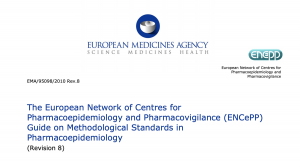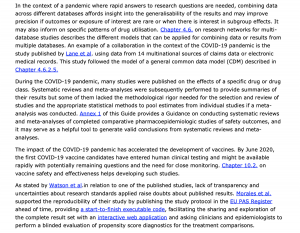 The European Medicines Agency (EMA) provided guidance for scientific best practices in observational research in the recently released 8th revision of its guidelines. This work aligns with OHDSI’s mission, and our global community was proud to see multiple OHDSI efforts, including a pair of COVID-19 studies, have informed and supported their recommendations.
The European Medicines Agency (EMA) provided guidance for scientific best practices in observational research in the recently released 8th revision of its guidelines. This work aligns with OHDSI’s mission, and our global community was proud to see multiple OHDSI efforts, including a pair of COVID-19 studies, have informed and supported their recommendations.
The foreword in “The European Network of Centres for Pharmacoepidemiology and Pharmacovigilance (ENCePP) Guide on Methodological Standards in Pharmacoepidemiology” highlighted a pair of community preprints currently undergoing peer review.
 ENCePP noted that “combining data across different databases affords insight into the generalisability of the results and may improve precision if outcomes or exposure of interest are rare or when there is interest in subgroup effects.” The network study led by Jennifer Lane that evaluated the safety profile of hydroxychloroquine, alone and in combination with azithromycin, was specifically cited in this section.
ENCePP noted that “combining data across different databases affords insight into the generalisability of the results and may improve precision if outcomes or exposure of interest are rare or when there is interest in subgroup effects.” The network study led by Jennifer Lane that evaluated the safety profile of hydroxychloroquine, alone and in combination with azithromycin, was specifically cited in this section.
ENCePP also highlighted the critical value of transparency in relation to observational science. The EMA cited the renin-angiotensin system blockers and susceptibility to COVID-19 study, authored by Daniel Morales, for supporting “the reproducibility of their study by publishing the study protocol in the EU PAS Register ahead of time, providing a start-to-finish executable code, facilitating the sharing and exploration of the complete result set with an interactive web application and asking clinicians and epidemiologists to perform a blinded evaluation of propensity score diagnostics for the treatment comparisons.”
OHDSI is a multi-stakeholder, interdisciplinary collaboration to bring out the value of health data through large-scale analytics. All solutions, generated via an international network of researchers and observational health databases, are open-source.
OHDSI’s global efforts surrounding COVID-19 are ongoing, with a significant focus on describing the baseline demographic and clinical characteristics, as well as treatments and occurrence of outcomes of interest among individuals tested for SARS-CoV-2 or diagnosed with COVID-19 after December 1, 2019, overall and by sex, age, and comorbidities.
These studies are part of the CHARYBDIS Project, which currently includes more than 1.2 million patients diagnosed or tested positive for COVID-19, and nearly 250,000 patients hospitalized with COVID-19 across 16 databases from six different nations. While the OHDSI community continues to seek data partners to join this effort, the current data is publicly available at https://data.ohdsi.org/Covid19CharacterizationCharybdis/.
